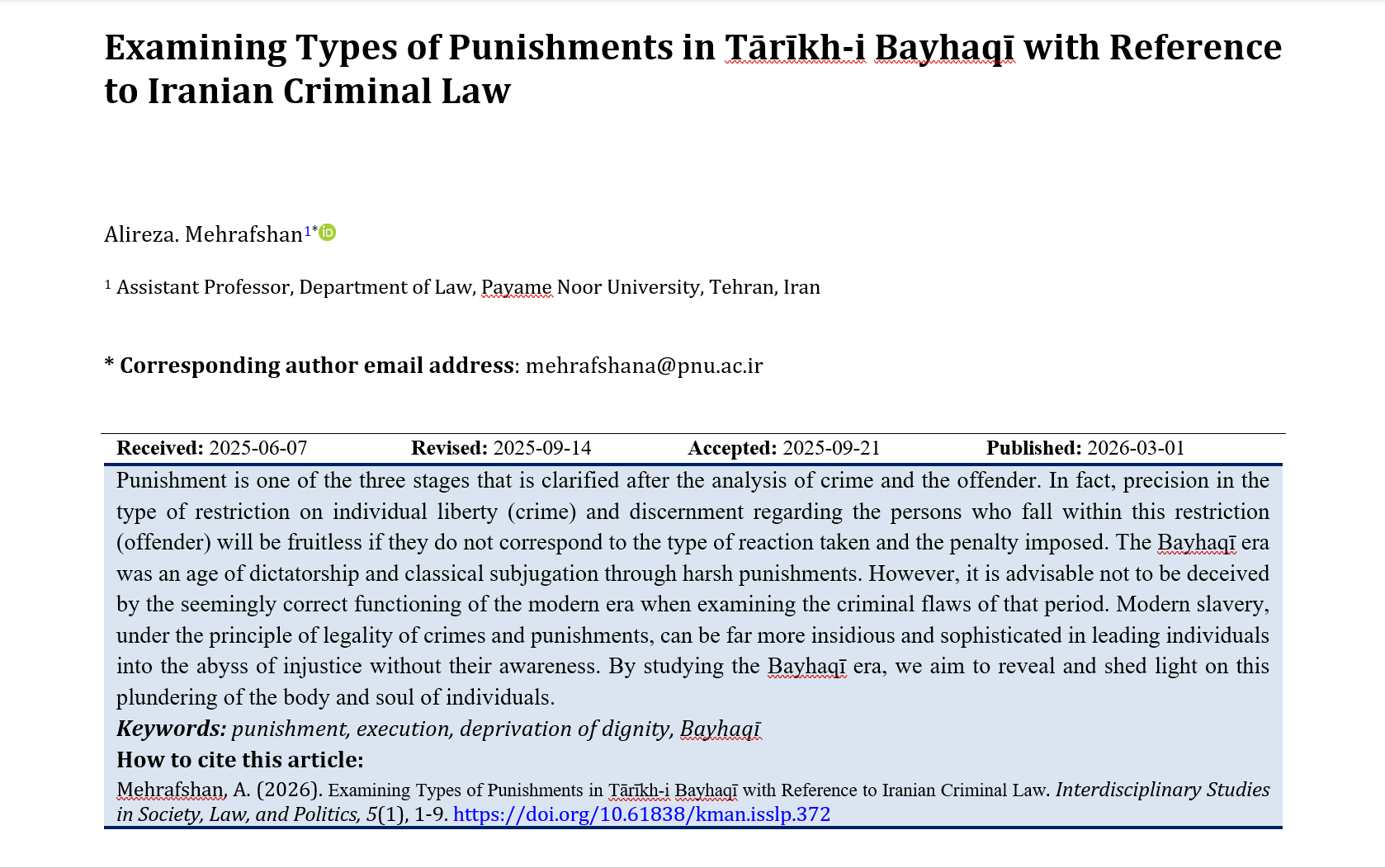Examining Types of Punishments in Tārīkh-i Bayhaqī with Reference to Iranian Criminal Law
Keywords:
punishment, execution,, deprivation of dignity, BayhaqīAbstract
Punishment is one of the three stages that is clarified after the analysis of crime and the offender. In fact, precision in the type of restriction on individual liberty (crime) and discernment regarding the persons who fall within this restriction (offender) will be fruitless if they do not correspond to the type of reaction taken and the penalty imposed. The Bayhaqī era was an age of dictatorship and classical subjugation through harsh punishments. However, it is advisable not to be deceived by the seemingly correct functioning of the modern era when examining the criminal flaws of that period. Modern slavery, under the principle of legality of crimes and punishments, can be far more insidious and sophisticated in leading individuals into the abyss of injustice without their awareness. By studying the Bayhaqī era, we aim to reveal and shed light on this plundering of the body and soul of individuals.
Downloads
References
Alizadeh, H., Nikkhah Saranaghi, R., Javadi, M., & Seyyed Isfahani, H. (2022). The dream of depenalization of imprisonment to the aspects of deterrence and non-punishment in light of the 2020 law reducing the discretionary prison sentence. Criminal Law and Criminology Research, 10.
Ardabili, M. A. (2015). General Criminal Law (Vol. 3). Mizan Publishing.
Bayhaqi, M. H. (2005). Tarikh-e Bayhaqi. Hirmand Publishing.
Bayhaqi, M. H. (2021). Tarikh-e Bayhaqi. Sokhan Publications.
Beccaria, C. (1995). On Crimes and Punishments. https://doi.org/10.1017/CBO9780511802485.006
Dante. (2016). The Divine Comedy (Inferno). Amirkabir Publications.
Elham, G., Vatani, A., & Hasanzadeh, M. (2017). The necessity of limiting prison sentences by emphasizing the difference between habs and sijn in jurisprudential sources and literature. Journal of Social Jurisprudence, 6.
Farmani Anousheh, N., Zumurudi, H., Akbari, M., & Golchin, M. (2018). A critique of the interaction of power and knowledge (criminology and punishment) in some Persian prose texts with a Foucaultian approach. Literary Text Research, 22.
Habibzadeh, M. J., Maldaar, M. H., & Hasanzadeh Khabbaz, S. N. (2024). A critical inquiry into corporal punishments in light of a functionalist reading of the four sources of Islamic law in the contemporary world. Criminal law and Criminology Studies(1).
Khaleghi, A. (2015). Criminal Procedure (Vol. 1). Shahr-e Danesh.
Khazanehdarloo, M. A., & Asgharzadeh, M. (2019). A re-reading of the tragic events in Tarikh-e Bayhaqi based on the characteristics of Aristotelian and Brechtian theater. Literary Text Research(81).
Mahmoudi, J., & Haji, A. (2023). The evolution of punishments in light of changing cultural values during the Constitutional era. (pp. 232).
Mehra, N. (2019). The effect of crime characteristics on sentencing. Journal of Legal Research, 22. https://doi.org/10.29252/lawresearch.22.88.63
Nobahar, R. (2013). An inquiry into the foundations of the Hudud-Ta'zir classification in Islamic criminal jurisprudence. Journal of Legal Research, 16.
Nozari Ferdowsieh, M., Rostami Ghafasabadi, A., & Jahani, M. H. (2022). A jurisprudential re-examination of the criminal liability of an unseen supervisor in a deliberate homicide crime. Research on Islamic Jurisprudence and Law, 18.
Pradel, J. (1994). History of Criminal Thought. Shahid Beheshti University Publications.
Qarjehlou, A. (2007). Circumstances and evidence in Iranian and English criminal law Shahid Beheshti University].
Saeedi Abueshaghi, M., Bahmanpoury, A., & Jokar, S. M. (2024). A comparative evaluation of imprisonment in modern criminal law and Imami jurisprudence. Islamic Law Research Journal(63).
Talebian, Y., & Amin, N. (2018). An analysis and review of 'discourse-oriented structures' in Abolfazl Bayhaqi's narrative of 'Hasanak Wazir's story'. Literary Text Research, 22.
Zolfagharkhani, M. (2019). Torture and punishment in Tarikh-e Bayhaqi: A study of the story of Hasanak Wazir based on Michel Foucault's theories. Persian Prose Research, New Series.

Downloads
Additional Files
Published
Submitted
Revised
Accepted
Issue
Section
License
Copyright (c) 2025 Alireza Mehrafshan (Author)

This work is licensed under a Creative Commons Attribution-NonCommercial 4.0 International License.





